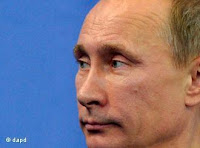 |
| The three countries hope to integrate their economies |
Twenty
years after the collapse of the Soviet Union, Russia wants to join two other
former Soviet republics in a new integration project. The Eurasian Union is to
be based on the EU - but its success is in doubt.
On January
1, 2012, a new version of the common economic area between Russia, Belarus and
Kazakhstan comes into effect. The three countries had already founded a customs
union in 2007, and Putin has said integration with the EU could take place by
2015.
The EU is a
model for the Eurasian Union right down to its name. The "Eurasian
Economic Commission" is to be the union's regulatory body, reminiscent of
the European Commission, the EU's Brussels-based executive body. Boris Gryzlov,
until recently the speaker of the Russian parliament, has already envisioned a
Eurasian parliament. The creation of a common currency is not impossible either.
Putin says the principle of equality should be especially important for the
union - but the success of that principle is in doubt.
 |
| The 'Eurasian Union' is the pet project of Vladmir Putin |
The
Eurasian Union is the pet project of Russian prime minister and designated
presidential candidate Vladimir Putin. It's not about copying or restoring the
Soviet Union, he wrote in October 2011 in an article published by the national
daily newspaper Izvestia.
Putin's
suggestion was "a new, strong, supranational union that could become one
of the poles of the modern world, and could play the role of an effective
bridge between Europe and the dynamic Asia-Pacific region." Russia is
first and foremost touting the economic benefits of such a union, like cheaper
gas. Kyrgyzstan and Tajikistan are in talks about joining as well.
Old new
integration
Putin's
ideas are not new. After the fall of the USSR, there were several attempts at
maintaining the connections among the former semi-republics. The best-known
example is the Commonwealth of Independent States formed in December 1991.
Observers consider the union to have failed. While it does serve as a platform
for dialogue among the heads of state, critics say the CIS has been unable to
produce any noteworthy successes in integration.
The one
exception is the free trade treaty signed by eight countries in October 2011.
But in resolving political conflicts, the CIS has proven to be ineffective. It
was unable to prevent the war between Russia and Georgia in 2008, after which
Georgia quit the union all together.
The idea of
a common economic area has also already existed since 2003 among the three
Slavic republics Russia, Belarus and Ukraine, and the central Asian Kazakhstan.
However this was much more of an agreement on paper than in practice. Now this
union is to be resurrected, presumably without Ukraine, which is now aspiring
to integration with the EU.
Russian
dominance
 |
| Russia, like Belarus and Kazakhstan, is criticized for a lack of transparent democracy |
The three
founding members all have dictatorial tendencies, though to varying degrees.
Freedom of the press and the rule of law have suffered under Vladimir Putin's
Russia, typified in the massive protests across the country against apparently
falsified election results. Belarusian President Victor Lukashenko is commonly
dubbed "the last dictator in Europe" and finds himself confronted
with ever-harsher sanctions from the EU. And Kazakh President Nursultan
Nazarbayev, in power for 20 years, is the object of a growing personality cult.
At the beginning of this month, parliament declared the 71-year-old strongman
"hero of the nation."
Experts see
the chances of the Eurasian Union becoming an "EU of the East" as
slim to none. Eastern Europe expert Gerhard Simon of the University of Cologne
said the principle of equality, as exemplified in the EU, has no chance of
taking root in the new bloc.
"It's
unimaginable for me to think that the Russian political class would be ready
hand over to the Kyrgyz the right to make political and economic decisions that
could be binding for Russia," Simon told Deutsche Welle. He added that he
did not think the Eurasian Union was exclusively about economics.
"Behind
that there is the goal of the integration of security policy, the military and
politics in general," he said. In the driver's seat, Simon added, will
undoubtedly be Russia.
The people
say yes, but…
 |
| The economic union could branch out into areas of security and politics |
Whether the
new union in the post-Soviet bloc can be successful at a less ambitious level
remains to be seen, Simon said. Other experts see success as entirely possible.
Alexander Rahr of the German Council on Foreign Relations said he could foresee
the creation of a new cultural, political and economic union, but not one
comparable to the Soviet Union.
Eberhard
Schneider of the EU-Russia Center in Brussels said that an attempt to create a
union similar to the EU with free movement of people, goods, finance and
services has a chance at success. However not all individual states of the
former Soviet Union would take part.
Support for
closer integration with former Soviet republics appears to have a plurality
among the Russian population. According to a survey by the opinion research
institute WZIOM, 43 percent of Russians said a common economic area would be
more useful than harmful. About one third of respondents said they favored
closer relations with those countries over a formal union.
What is
clear is that many Russians are poorly informed about their government's
attempts at integration. Only 53 percent of Russians surveyed in November by
the research organization the Levada Center knew of the plans to merge the
economies of Russia, Belarus and Kazakhstan, while 45 percent said they were
completely unaware of them.
Author: Roman Goncharenko / acb











No comments:
Post a Comment
Note: Only a member of this blog may post a comment.